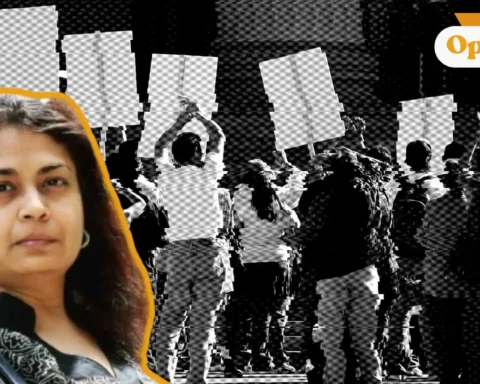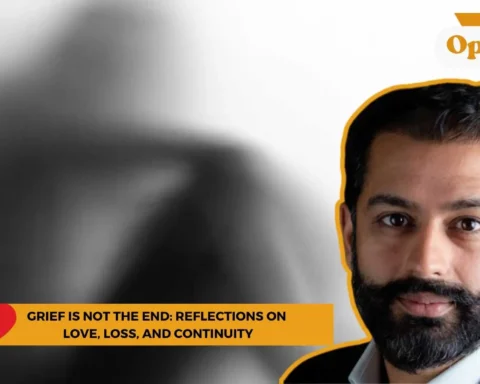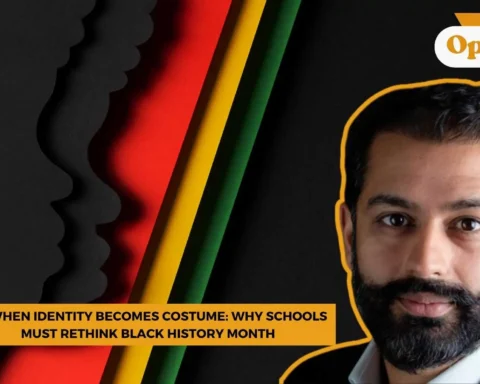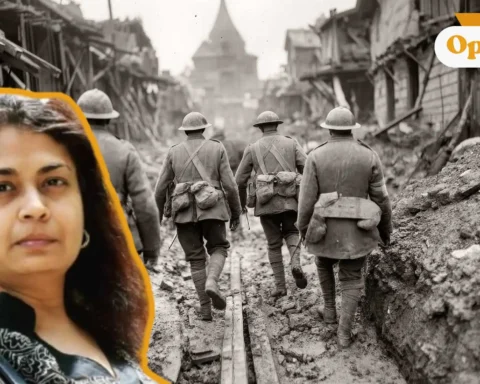Four years before her highly acclaimed novel, The God of Small Things, took bookshelves and literary awards by storm, Arundhati Roy penned an essay titled The Great Indian Rape Trick. The essay served as a critique of the film Bandit Queen by Shekhar Kapur. The film chronicles the early life of Phoolan Devi, a dacoit later turned politician.
Phoolan Devi was born into a lower caste in Uttar Pradesh. Her early life was marked by a myriad of tribulations. Her family was on the losing end of a land dispute, which plunged them further into poverty.
Through her essay, which is more than just an analysis of the film, Roy questions the motives of the film but also challenges society’s views on rape, femininity and the portrayal of truth on screen.
In the early parts of her essay, Roy takes issue with the promotion of the film. Director Shekhar Kapur, insists that the film is a depiction of the truth. This assertion is contested by Roy as Kapur never met Phoolan Devi, the person his “true story” is about.

Kapur claims to have based the movie off of a biography written by Mala Sen, titled India’s Bandit Queen: The True Story of Phoolan Devi. However, the book weaves Phaloon Devi’s story as a tapestry that follows various threads using interviews, newspaper stories and meetings with Devi herself. As Roy highlights in her essay, this leads to various versions of the same event. Sometimes in complete contradiction with each other.
This nuanced and complex depiction of Devi’s life is omitted from the film. Instead, it has narrowed down to fit Kapur’s idea of who Devi was, or rather who he wanted her to be.
Roy describes this as “Legendtitis”, as though the “Legend” and reputation that preceded her was a disease, masking who she actually was.
The film heavily focuses on the multiple times Devi faced sexual assault. Showing her victimhood in several instances, something that Roy, in her criticism, views as a perversion of not just Devi’s life story but the reality of rape in general.
As stated before, Kapur never met Devi, basing his film off of Sen’s book. Sen, who’d met Devi, noted how she did not go into the details of the amount of times she was raped. Kapur’s film chose to ignore these striking facts, choosing to make these events an almost focal point of his film. In the name of creating a “true story”.
The focus on rape in the film isn’t just distasteful because Kapur never cared enough to meet the woman whom he shows being abused time and time again. But rather, he makes it seem as though it was the defining point of Devi’s life (again, the film was released during Devi’s lifetime. We’re talking about repeatedly showing the rape of a living woman without her consent to the masses).
The overemphasis on rape just ignores all the other moments in Devi’s life. For instance, Roy, in her essay, points out that Devi’s first act of process was when she was ten years old during the land dispute.
“Phoolan Devi’s first war, like almost every dacoit’s first war, was fought for territory. It was the classic beginning of the journey into dacoitdom. But does it have rape in it? Nope. Caste violence? Nope. So is it worth including in the film? Nope.”
Roy further writes. “According to Shekhar Kapur’s film, every landmark—every decision, every turning point in Phoolan Devi’s life, starting with how she became a dacoit in the first place, has to do with having been raped or avenging rape.”
This implicitly underlines how we judge women. The standard by which a woman’s value is determined is her “sexual morality”. Never mind all the sexual liberties afforded to men.
This exploitation of someone’s rape as a storytelling device is greatly questioned by Roy. Displaying someone’s victimhood in great detail in cinema halls across the country, without even meeting them once, is distasteful enough. But it also sanitizes the reality of rape.

Whilst the film will almost explicitly show Devi repeatedly assaulted, it displays this in a way that is digestible. Devi is shown to be abused to the point of near numbness, seemingly in an effort to let it be easy for the audience to consume.
But we’re told repeatedly that this is a true story. If so true and so similar to reality, then why are we packaging rape in shiny wrappers? Were we not promised the truth? Then what of the wounds to the genitals and breasts that women who are victims of gang rape so often suffer?
As Roy critiques the film for its deliberate one-dimensional approach, lower caste girl turned rape victim turned bandit, and it becomes obvious the Phoolan Devi in his film is moulded out of the clay that Kapur and, to a larger extent, society demands all women be moulded from.
The clay of stereotypical femininity. That of purity that is so simplistic in nature that it’s borderline one-dimensional.
As Roy points out in her essay, when Devi returns to her husband, who’d abused and sent her away at the behest of his second wife, who had also participated in her early humiliation, she seeks vengeance. According to Mala Sen’s book and Devi herself, she thought to kill them both but settled to only beating them up, breaking her (the second wife) hands and legs.
The latter part of this is omitted from the film because, as Roy writes, “But what nice woman would do that? Beat up another woman? How would you feel sorry for someone like that?”.
Another omission is the mention of the numerous relationships Devi had, though these relationships are mentioned in the book.
But this isn’t just a reflection of Kapur’s directorial decisions but those of society. How dare a woman be a complex being? How dare she? Our perception of a woman, a good moral woman at least, is as narrow as narrow can be. Anything that strays beyond those confines must reigned back in. This is reflected in the film with its portrayal of Phoolan Devi.
Roy further expands on this in her essay, saying, “The Rape of a nice Woman (saucy, headstrong, foul-mouthed perhaps, but basically moral, sexually moral)—is one thing. The rape of a nasty/perceived-to-be-im-moral woman is quite another. It wouldn’t be quite so bad. You wouldn’t feel quite so sorry. Perhaps you wouldn’t feel sorry at all.
Any policeman will tell you that. Whenever the police are accused of custodial rape, they immediately set to work. Not to prove that she wasn’t raped. But to prove that she wasn’t nice. To prove that she was a loose woman. A prostitute. A divorcee. Or an Elopee—i.e., she asked for it. Same difference.”
Our projections of what a woman should be is what creates this constricted version of Devi. Because the film demands she be a heroine she must then conform to the molding that we’ve placed on all women. Unironically, this perversion of the Devi’s life by male filmmakers is symbolic of the same in our society.
Revisiting this now 30-year-old essay is important, for it still rings true for our society. We’d like for you to join the conversation. Let us know your thoughts in the comments below. If you have burning thoughts or opinions to express, please feel free to reach out to us at larra@globalindiannetwork.com.










